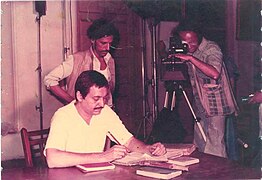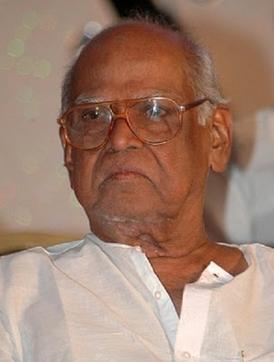
Sattiraju Lakshminarayana, known professionally as Bapu, was an Indian film director, painter, illustrator, cartoonist, screenwriter, music artist, and designer known for his works in Telugu cinema, and Hindi cinema. In 2013, he was awarded the Padma Shri, for his contribution to Indian art and cinema. He has garnered two National Honors, two National Film Awards, seven state Nandi Awards, two Filmfare Awards South, a Raghupathi Venkaiah Award, and a Filmfare Lifetime Achievement Award – South.

Uttam Kumar, widely known as Mahanayak, was an Indian film actor, producer, director, screenwriter, composer, and playback singer who predominantly worked in Bengali cinema. His career spanned three decades, from the late 1940s until his death in 1980. Kumar is regarded as one of the greatest actors in the history of Indian cinema and also the most popular and successful film star in Bengal.

Madhabi Chakraborty is an Indian actress. She won the National Film Award for Best Actress for her performance in the Bengali film Dibratrir Kabya. She has acted in some of the most critically acclaimed films in Bengali cinema and is considered one of the great actresses of Bengali cinema.

Supriya Devi was an Indian actress who is known for her work in Bengali cinema for more than 50 years. She is best known for her portrayal of Neeta in Ritwik Ghatak's Bengali film Megha Dhaka Tara (1960). She was conferred the Filmfare Award and the BFJA Award twice. In 2011, she received the Banga-Vibhushan, the highest civilian honour in West Bengal. In 2014, she was awarded the Padma Shri by the Government of India, the fourth highest civilian award in India, for her contributions to the entertainment industry.
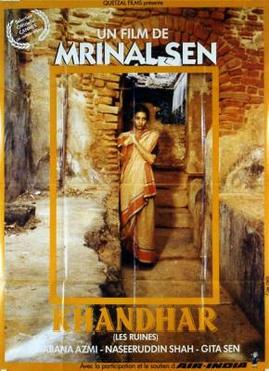
Khandhar is a 1984 Indian Hindi-language film directed by Mrinal Sen, based on Premendra Mitra's Bengali short story Telenapota Abishkar. The film stars Shabana Azmi, Naseeruddin Shah and Pankaj Kapur. It was screened in the Un Certain Regard section at the 1984 Cannes Film Festival.

Critics' Week, until 2008 called International Critics' Week, is a parallel section to the Cannes Film Festival organized by the French Syndicate of Cinema Critics. It was created in 1962, after the French Syndicate of Cinema Critics's successful campaign for Shirley Clarke's The Connection to be screened at the 1961 Cannes Film Festival. It is the oldest non-official Cannes sidebar.
Sreelekha Mitra is an Indian actress and director who is known for her work in Bengali cinema. Winner of a BFJA Award and an Anandalok Award, Mitra is best known for her roles in films such as Hothat Brishti (1998), Kantatar (2006), Aschorjo Prodip (2013), Swade Ahlade (2015), Choukath (2015) and Rainbow Jelly (2018).

The 43rd Cannes Film Festival took place from 10 to 21 May 1990. Italian filmmaker Bernardo Bertolucci served as jury president for the main competition.
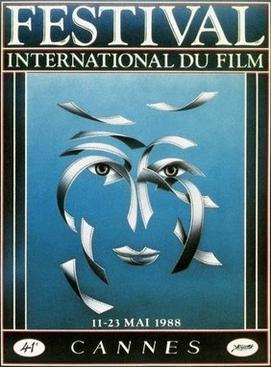
The 41st Cannes Film Festival took place from 11 to 23 May 1988. Italian filmmaker Ettore Scola served as jury president for the main competition.

The 40th Cannes Film Festival took place from 7 to 19 May 1987. French-Italian actor Yves Montand served as jury president for the main competition.

Bikash Roy was an Indian actor and filmmaker who is known for his work in Bengali cinema. He is considered as one of the best character artists of india, all time. He has also acted in lead roles in few movies and is well known for his character roles and for his own style of acting in Bengali films from the late 1940s until the mid-1980s.
Joachim Trier is a Danish-born Norwegian filmmaker. His films have been described as "melancholy meditations concerned with existential questions of love, ambition, memory, and identity." He has received numerous nominations including for a Academy Award, a BAFTA Award, two Cesar Awards, and three Cannes Film Festival Awards.
Oka Oori Katha is a 1977 Indian Telugu-language drama film directed by Mrinal Sen. An adaptation of Munshi Premchand's short story Kafan, the film transports the narrative from the Hindi heartland of Premchand to the rural landscapes of Telangana. Starring M. V. Vasudeva Rao, G. V. Narayana Rao, and Mamata Shankar, the film sharply critiques feudal exploitation by depicting the harsh lives of a father-son duo who resist the oppressive system by refusing to work.

The Cinema of Manipur is the film industry based in Manipur, India. It includes not only Meitei language movies but all the films made in different languages of the different communities in Manipur. The Manipuri film industry was born when Matamgi Manipur by Debkumar Bose was released on 9 April 1972. From Aribam Syam Sharma's Paokhum Ama and M.A. Singh's Langlen Thadoi to Oken Amakcham's Lammei and Haobam Paban Kumar's Loktak Lairembee and many others, Manipuri cinema, which celebrated its 50th anniversary in 2022, has grown in both its form and culture.
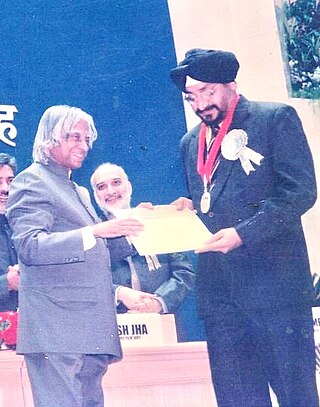
Gul Bahar Singh is a six time national award winning Indian film-maker. He received first national award in 1986 for his documentary film, Anukaran.

Rohena Gera, born in 1973, is an Indian director, screenwriter and producer.

The 72nd annual Cannes Film Festival took place from 14 to 25 May 2019. Mexican filmmaker Alejandro González Iñárritu served as jury president for the main competition. South Korean filmmaker Bong Joon-ho won the Palme d'Or, the festival's top prize, for the drama film Parasite; Bong became the first Korean to win the award.
Amin Sidi-Boumédiène, is a Franco–Algerian filmmaker. He is best known as the director of critically acclaimed short Al Djazira and film Abou Leila.
Carlo Francisco Manatad is a Filipino filmmaker and editor. He is one of the most prolific editors in the Philippines and has edited the films Ruined Heart (2014), A Gentle Night (2017), Balangiga (2017) and Women of the Weeping River (2018) to name a few. As a director, his films have screened in a number of international film festivals, such as in Locarno, Toronto, Busan, and Cannes.

Lillah Halla is a Brazilian film director.

